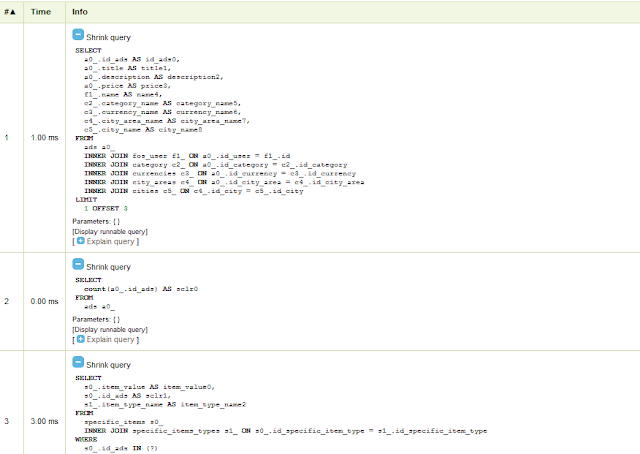I will first implement pagination in a similar way as I did for CPANABasicBlogBundle in this post.
Documentation:
http://doctrine-orm.readthedocs.org/projects/doctrine-orm/en/latest/tutorials/pagination.html
http://anil.io/post/41/symfony-2-and-doctrine-pagination-with-twig - tutorial
Starting with version 2.2 Doctrine ships with a Paginator for DQL queries. It has a very simple API
and implements the SPL interfaces Countable and IteratorAggregate.
I. Pagination using Paginator class
1. First modify the path.The path should have a parameter "currentPage" which can be optional, and the default value is 1:
cpana_classifieds_public_ads_show_all:
path: /classifieds/ads/showall/{currentPage}
defaults: { _controller: CPANAClassifiedsBundle:Pub\Ads:showAll,currentPage:1}
2. Modify the repository :
public function findAllAdsCustom($currentPage = 1, $limit)
{
//retrieve the associated Query object with the processed DQL
$qb= $this->getEntityManager()
->createQuery(
'SELECT a.idAds, a.title, a.description, a.price
,u.name
,cat.categoryName
,c.currencyName
,ca.cityAreaName
,city.cityName
FROM CPANAClassifiedsBundle:Ads a
JOIN a.idUser u
JOIN a.idCategory cat
JOIN a.idCurrency c
JOIN a.idCityArea ca
JOIN ca.idCity city'
)
->getQuery();
$paginator = $this->paginate($query, $currentPage, $limit);
return $paginator;
}
public function paginate($dql, $page = 1, $limit = 3)
{
$paginator = new Paginator($dql);
$paginator->setUseOutputWalkers(false);
$paginator->getQuery()
->setFirstResult($limit * ($page - 1)) // Offset
->setMaxResults($limit); // Limit
return $paginator;
}
-------------------------------------------
If you try to run the code without this line " $paginator->setUseOutputWalkers(false);" you get this error "Error: Not all identifier properties can be found in the ResultSetMapping:idAds"
http://www.doctrine-project.org/jira/browse/DDC-1927
http://stackoverflow.com/questions/24837913/doctrine-2-pagination
https://groups.google.com/forum/#!topic/doctrine-user/AVbeIyaGvfQ
3. In the controller add:
....
use Doctrine\ORM\Tools\Pagination\Paginator
...
public function showAllAction($currentPage)
{
$limit = 3;
$em = $this->getDoctrine()->getManager();
$ads = $em->getRepository('CPANAClassifiedsBundle:Ads')->findAllAdsCustom($currentPage, $limit);
$allSpecificItems = $em->getRepository('CPANAClassifiedsBundle:SpecificItems')->findAllItemsCustom();
$maxPages = ceil($ads->count()/$limit);
$thisPage = $currentPage;
if (!$ads) {
throw $this->createNotFoundException('Unable to find ads.');
}
return $this->render('CPANAClassifiedsBundle:Pub\Ads:show_all.html.twig', array(
'all_ads' => $ads,
'maxPages'=>$maxPages,
'thisPage' => $thisPage,
'all_items' => $allSpecificItems
) );
}
----------------------
4. View
-------
{% block content %}
<table style="width:100%">
{% for ad in all_ads %}
<tr><hr></tr>
<tr><h1> {{ ad['title'] }}</h1></tr>
<tr><p><b>Posted by: </b> {{ ad['name'] }}</p></tr>
.....
</table>
{% if maxPages > 1 %}
<ul>
{%if thisPage > 1 %}
<li >
<a href="{{ path('cpana_classifieds_public_ads_show_all', {currentPage: thisPage-1 < 1 ? 1 : thisPage-1}) }}">«</a>
</li>
{% endif %}
{# Render each page number #}
{% for i in 1..maxPages %}
<li>
<a href="{{ path('cpana_classifieds_public_ads_show_all', {currentPage: i}) }}">{{ i }}</a>
</li>
{% endfor %}
{# `»` arrow #}
{%if thisPage < maxPages %}
<li>
<a href="{{ path('cpana_classifieds_public_ads_show_all', {currentPage: thisPage+1 <= maxPages ? thisPage+1 : thisPage}) }}">»</a>
</li>
{% endif %}
</ul>
{% endif %}
{% endblock %}
I have only 6 ads so I modified the limit=1 to get the following:
--------------------------------------------------------------------------------------------------
II. Pagination directly from DQL
http://doctrine-orm.readthedocs.org/projects/doctrine-orm/en/latest/reference/dql-doctrine-query-language.html
14.7.6.5. First and Max Result Items (DQL Query Only)---------------------------------------------------------------------------------------------------------
You can limit the number of results returned from a DQL query as well as specify the starting offset, Doctrine then uses a strategy of manipulating the select query to return only the requested number of results:
Query::setMaxResults($maxResults)
Query::setFirstResult($offset)
If your query contains a fetch-joined collection specifying the result limit methods are not working as you would expect. Set Max Results restricts the number of database result rows, however in the case of fetch-joined collections one root entity might appear in many rows, effectively hydrating less than the specified number of results.
1. Modify AdsRepository.php by adding:
public function findAllAdsMyPagination($currentPage = 1, $limit)
{
$query= $this->getEntityManager()
->createQuery(
'SELECT a.idAds, a.title, a.description, a.price
,u.name
,cat.categoryName
,c.currencyName
,ca.cityAreaName
,city.cityName
FROM CPANAClassifiedsBundle:Ads a
JOIN a.idUser u
JOIN a.idCategory cat
JOIN a.idCurrency c
JOIN a.idCityArea ca
JOIN ca.idCity city'
);
$query->setFirstResult($limit * ($currentPage - 1)) // Offset
->setMaxResults($limit); // Limit
$result = $query->getResult();
return $result;
}
public function countAllAds()
{
$query= $this->getEntityManager()
->createQuery(
'SELECT count(a.idAds) FROM CPANAClassifiedsBundle:Ads a');
$count = $query->getSingleScalarResult();;
return $count;
}
Note: As you can see I've added a new method which is counting all the records in ads table.
2. Modify controller to use the new method findAllAdsMyPagination():
public function showAllAction($currentPage)
{
$limit = 3;
$em = $this->getDoctrine()->getManager();
$ads = $em->getRepository('CPANAClassifiedsBundle:Ads')->findAllAdsMyPagination($currentPage, $limit);
$totalAds = $em->getRepository('CPANAClassifiedsBundle:Ads')->countAllAds();
$allSpecificItems = $em->getRepository('CPANAClassifiedsBundle:SpecificItems')->findAllItemsCustom();
$maxPages = ceil($totalAds/$limit);
$thisPage = $currentPage;
if (!$ads) {
throw $this->createNotFoundException('Unable to find ads.');
}
return $this->render('CPANAClassifiedsBundle:Pub\Ads:show_all.html.twig', array(
'all_ads' => $ads,
'maxPages'=>$maxPages,
'thisPage' => $thisPage,
'all_items' => $allSpecificItems
) );
}
-----------------------
Nothing changes in the view
-------------------------------
III. Loading information from the many side of the Many-To-One relation.
Now let's improve also the way I retrieve the associated SpecificItems. At this moment I retrieve the entire table, but I should load only the values for the set of ads listed on one page (after applying pagination).
1. In "SpecificItemsRepository" I created a new method which receive as parameter a list of ads as an array of arrays.
public function findItemsForAdsList($ads)
{
$ads_id_list = array();
foreach($ads as $ad) {
$ads_id_list[]=$ad['idAds'];
}
$query = $this->getEntityManager()
->createQuery(
'SELECT si.itemValue
,IDENTITY(si.idAds)
,ty.itemTypeName
FROM CPANAClassifiedsBundle:SpecificItems si
JOIN si.idSpecificItemType ty
WHERE IDENTITY(si.idAds) IN (:list)'
);
$query->setParameter('list', $ads_id_list);
return $query->getResult();
}
------
2. In controller just replace FindAllItemsCustom() with
$allSpecificItems = $em->getRepository('CPANAClassifiedsBundle:SpecificItems')->findItemsForAdsList($ads);
3. Nothing changes in the view.
The SQL queries generated by Doctrine are the following:









